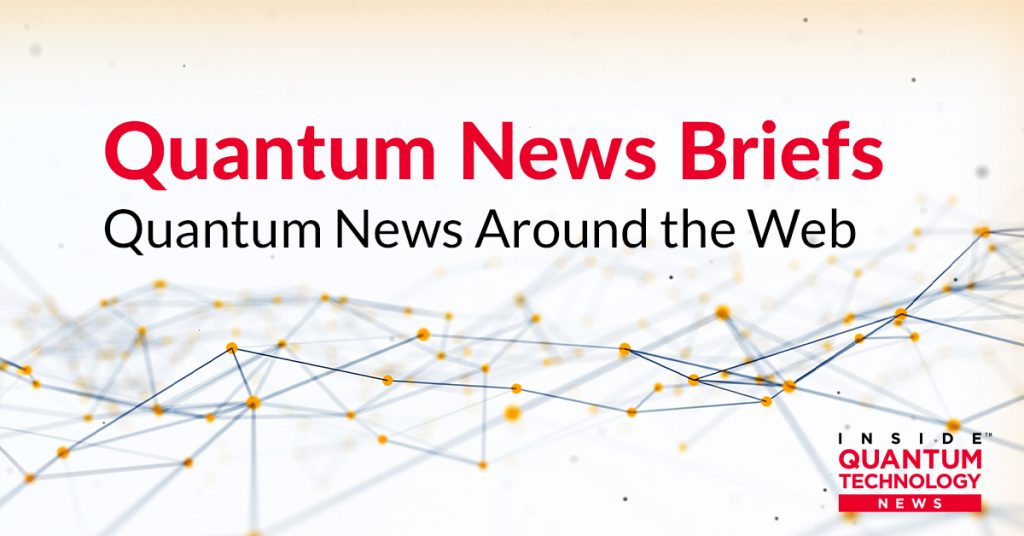Quantum News Briefs opens today with QuSecure’s announcement it has immediately addressed NIST-discovered network quantum vulnerabilities, followed by a rare view into Raytheon whose representatives shared perspectives in a recent webinar on quantum computing, cyberworkforce development, & advancement of zero trust. Next is the news of a future looking quantum industry certificate course being launched by the UChicago this fall. And MORE.
QuSecure’s Cybersecurity Solution Immediately Addresses NIST-Discovered Network Quantum Vulnerabilities
Last week, NIST announced a group of collaborating companies who will work with the National Cybersecurity Center of Excellence (NCCoE) to demonstrate the use of automated discovery tools to identify instances of quantum-vulnerable public-key algorithm use within networks, where they are used in dependent systems, and the function they support.
QuProtect is uniquely equipped to leverage the discovery work of NIST’s new team as the only PQC solution actively installed today and supporting the Kyber-based algorithm NIST recently selected for post-quantum cryptography standardization. Click here to review the complete announcement from Qusecure.
****
Raytheon Gives Rare Look at Perspectives on Quantum Computing, Cyberworkforce Development, & Advancement of Zero Trust
The speakers discussed preparing for quantum computing and Q-Day, the day on which quantum computers will be powerful enough to break today’s asymmetric encryption schemes, such as RSA, Diffi-Helman, Elliptic Curve Cryptography and DSA. While many of the traditional cyber defense skills and roles will still be relevant and transferable to a post-quantum world, the tools to defeat quantum attacks will be different, starting at the encryption algorithm and extending to areas like quantum machine learning.
Even though they are a high-profile defense contractor, Raytheon has the same challenges as other corporations when it comes to hiring cybersecurity professionals during the Great Resignation, said Melissa Rhodes, senior director of human resources at Raytheon Intelligence & Space.
“The preponderance of the work we do is in the classified space, which makes talking about the work we do very difficult,’’ Rhodes said. This has required coming up with some creative ways to make people aware that they are looking for cybersecurity talent.
The speakers also spent time discussing how to implement zero trust, following the Biden administration’s executive order requiring that government entities implement a zero trust architecture.
*****
UChicago Launches New Quantum Industry Certificate Course
The seven-week certificate in Quantum Science, Networking, and Communications is UChicago’s second quantum certificate. In 2020, the Pritzker School of Molecular Engineering (PME) and the Chicago Quantum Exchange (CQE) “launched the Certificate Programs in Quantum Engineering and Technology with a four-day intensive course in Quantum Science and Engineering for advanced professionals with training in the classical sciences.
The new certificate course, offered in partnership with the NSF Quantum Leap Challenge Institute for Hybrid Quantum Architectures and Networks (HQAN), will meet from October 4 through November 20 on Tuesdays and Thursdays at 7:00 p.m. to accommodate the widest range of working people with the right skill set. Building on UChicago’s focus to help drive innovation inclusivity through its existing partnerships, a small number of scholarships will be available for recent Chicago State University graduates. Click here for Quantum Science, Networking, and Communications website
****
Anti-Butterfly Effect Enables New Benchmarking of Quantum Computer Performance
Research drawing on the quantum “anti-butterfly effect” solves a longstanding experimental problem in physics and establishes a method for benchmarking the performance of quantum computers.
“Using the simple, robust protocol we developed, we can determine the degree to which quantum computers can effectively process information, and it applies to information loss in other complex quantum systems, too,” said Bin Yan, a quantum theorist at Los Alamos National Laboratory.
“Our protocol quantifies information scrambling in a quantum system and unambiguously distinguishes it from fake positive signals in the noisy background caused by quantum decoherence,” he said.
The Los Alamos team demonstrated the protocol with simulations on IBM cloud-based quantum computers.
Click here to read the complete discussion of the research and the findings
****
Sandra K. Helsel, Ph.D. has been researching and reporting on frontier technologies since 1990. She has her Ph.D. from the University of Arizona.
